Search Results
Showing results 1 to 20 of 57
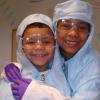
Tiny Particles, Big Trouble!
Source Institutions
In this activity, learners discover why some nanoscale science and technology is done in the controlled environment of a clean room, what clean rooms are like, and how scientists help keep the clean r
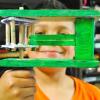
Matraca
Source Institutions
In this activity, learners create a traditional Mexican noisemaker (a matraca) using cardboard, craft sticks, and a wooden dowel.

Smelly Balloons
Source Institutions
In this activity, learners sniff out scents hidden in balloons! After investigating, learners discover we sometimes can use another sense (smell) to detect things too small to see.
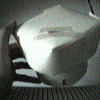
CD Spectroscope
Source Institutions
In this activity, learners use an old CD to construct a spectroscope, a device that separates light into its component colors.

Bronx Cheer Bulb
Source Institutions
In this activity, learners observe what happens when they give a light source like a neon glow lamp a "Bronx Cheer." The lights appear to wiggle back and forth and flicker when learners blow air throu

Robot Hands
Source Institutions
This activity (on page 2) explores how sensing is part of robotics. Learners try tying their shoes with different constraints.
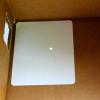
Pinhole Viewer
Source Institutions
In this activity, learners discuss and investigate how cameras, telescopes, and their own eyes use light in similar ways.

Iridescent Art
Source Institutions
This is a quick activity (on page 2 of the PDF under Butterfly Wings Activity) that illustrates how nanoscale structures, so small they're practically invisible, can produce visible/colorful effects.

Magic Wand
Source Institutions
In this activity about light and perception, learners create pictures in thin air.
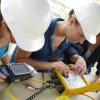
Robot Body Language
Source Institutions
In this robotics activity, learners find ways to express emotions and feelings using only body movements, not facial expressions.
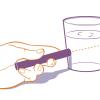
Beam Me Up!
Source Institutions
This is a quick activity (on page 2 of the PDF under Stained Glass Activity) about the "Tyndall effect," the scattering of visible light when it hits very small dispersed particles.
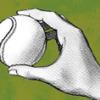
Helping Hand
Source Institutions
In this invention challenge activity, learners see how many objects they can grab with a homemade "bionic" arm.

Critical Angle
Source Institutions
In this optics activity, learners examine how a transparent material such as glass or water can actually reflect light better than any mirror.

Make a Light Fountain
Source Institutions
In this optics activity, learners make a "light fountain" from a clear plastic bottle, flashlight, and other simple materials.
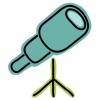
Make a Telescope
Source Institutions
In this optics activity, learners make a simple telescope using two lenses and a cardboard tube. Learners construct the telescope and then calculate its magnification.
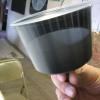
Mini Zoetrope
Source Institutions
In this activity (posted on March 27, 2011), learners follow the steps to construct a mini zoetrope, a device that produces an illusion of action from a rapid succession of static pictures.
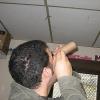
Spectroscope
Source Institutions
In this activity (posted on March 12, 2011), learners follow the steps to construct a spectroscope, a tool used to analyze light and color.
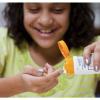
Invisible Sunblock
Source Institutions
In this activity, learners find out why some mineral sunblock rubs in clear. Learners compare nano and non-nano sunblocks and discover how particle size affects visibility.
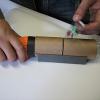
Camera Projector
Source Institutions
In this activity (posted on March 14, 2011), learners follow the steps to construct a camera projector to explore lenses and refraction.
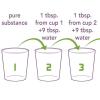
Sniffing for a Billionth
Source Institutions
This is an activity (located on page 4 of the PDF under What's Nano? Activity) about size and scale.
